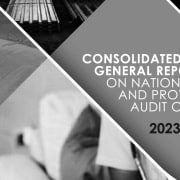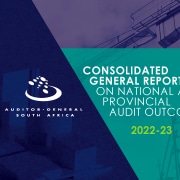|
Getting your Trinity Audio player ready...
|
Our new two-part miniseries focuses on the Public Finance Management Act (PFMA) audit outcomes for 2017/2018, tabled yesterday in Parliament by Auditor-General Kimi Makwetu, as well as the Public Audit Act (PAA) amendment bill that was signed into law a few days ago.
On Tuesday 20 November, the Government Gazette carried the announcement that President Cyril Ramaphosa had assented to the PAA bill on 18 November.
The law gives the Office of the Auditor-General South Africa (AGSA) more power to act against those who waste taxpayers’ money, as well as those who are aware that money is being siphoned but decline to hold the culprits to account.
While the auditor-general (AG) Kimi Makwetu has noted that no commencement date has been set, the development could not have come at a better time. Makwetu’s PFMA report for 2017/2018, which details the audit results of national and provincial government departments and their entities, showed a continuing trend of poor audit results, non-compliance, and lack of oversight.
Part one of our miniseries focuses on the public audit outcomes. Look out for part two, to be published on Monday 26 November. This part presents a more detailed look at the evolution of the Public Audit Act and the recent changes that have been made to it.
Same old, same old
This year’s PFMA audit trend falls in line with that of the four preceding years – more audit outcomes have regressed than improved. Makwetu attributed this largely to a lackadaisical attitude from those charged with governance.
“As our latest report reveals, various role players have been slow in implementing and, in certain instances, even blatantly disregarding our recommendations,” Makwetu said. “As a result, there is limited improvement in accountability for government spending and the risks we have been highlighting for a number of years are starting to materialise.”
The sluggish response by management to the messages from the AGSA was the main root cause of poor audit outcomes. However, AGSA staff have noted over the past year that management at 28% of the auditees with poor audit outcomes are just not responding at all.
While the audit results of 43 auditees improved, Makwetu noted, they were overshadowed by the 73 that regressed from the previous year.
Key findings
The 2017/2018 PFMA audit report makes for grim reading. Some of the key findings are that:
- the quality of the performance reports improved slightly to 65% of the auditees now publishing credible reports. However, the AGSA received performance reports for auditing with substantial misstatements;
- at national level there was a regression in audit outcomes, with the number of clean audits decreasing to 23 % of the total audited population compared to 30% in the previous financial year;
- provincially, the Western Cape and Gauteng continued to produce the best results – with 83% and 52% clean audits, respectively;
- there were serious weaknesses in the financial management of national and provincial government that had not been addressed over the past four years;
- unauthorised expenditure increased by 38% from the previous year to R2.1-billion, 86% of which was a result of overspending;
- fruitless and wasteful expenditure increased by over 200% from the previous year to R2.5-billion;
- irregular expenditure continued to remain high at R51-billion. This total includes the irregular expenditure of those auditees where the AGSA had completed the audits after the cut-off date of this report (R5.4-billion). It is worth noting that the R51-billion excludes the SOEs that are not audited by the AGSA, whose total irregular expenditure totalled R28.4-billion;
- the financial health of auditees continued to deteriorate;
- there was an emerging risk of increased litigation and claims against departments. Almost a third of the departments had claims against them in excess of 10% of their next year’s budget. “Departments do not budget for such claims, which means that all successful claims will be paid from funds earmarked for the delivery of services, further eroding the ability of these departments to be financially sustainable,” warned Makwetu;
- a total deficit of R35.1-billion was incurred by the 41% of public entities whose expenditure exceeded their revenue – 75% of this was the deficit of the Road Accident Fund. The AG cautioned that “even though the majority of public entities that incurred deficits would be able to continue their operations, these negative indicators raise concerns about their financial viability, which could result in pressure to acquire additional funding from government”;
- the auditees that substantially did not comply with legislation increased from 64% to 72%. The AG said the lapse in oversight and controls in the area of compliance was evident in a number of areas, including supply chain management (SCM), and led to increased irregular expenditure;
- the non-compliance with SCM legislation increased. Makwetu stressed that the status “was even worse than in 2014-15.”
Health, education, public works the biggest offenders
Education, health and public works had the poorest audit results. A third of these departments received qualified opinions (compared to only 16% of the other departments). Only two of the departments across these sectors received clean audit opinions.
Meanwhile, this cluster of departments is responsible for just over half of the departmental budgets and for implementing key programmes to improve the health and welfare of citizens.
If urgent attention is not given to the financial health of the provincial health and education departments, Makwetu warned, they may collapse altogether. For example, provincial education departments are guilty of almost R1-billion of unauthorised expenditure, and the Eastern Cape education department on its own racked up a deficit of almost R1.7-billion.
Provincial health departments in the Eastern Cape, Free State and the Northern Cape are particularly vulnerable, Makwetu said. The total deficit of the health departments amounted to R8.4-billion but even more disconcerting is the revelation that all the health departments, except the Western Cape and Free State, had claims against them that were more than their 2018-19 total operational budget. The claims against the Eastern Cape health department, Makwetu said, amounted to more than three times its operational budget.
Technical and vocational education and training colleges also struggled to account for their finances. For instance, of the 48 colleges audited by the AGSA, only three received clean audits compared to nine in the previous year.
“Questions should be asked about the potential loss of money through the poor management of assets, revenue and debtors at these colleges at a time when funding is desperately needed for tertiary education,” Makwetu pointed out.
State-owned entities going backwards
State-owned entities (SOEs) did not shine either, with audit results continuing to regress from the previous year and from 2014-15.
Makwetu singled out a few SOEs that were particularly worrying – the Independent Development Trust received a disclaimed opinion for the third year in a row and the South African Broadcasting Corporation (SABC) regressed from an adverse opinion to a disclaimed opinion.
Only the Development Bank of Southern Africa, which was audited by the AGSA for the first time, obtained a clean audit opinion.
Some SOE audits had not been completed by the cut-off date. They included the South African Airways group, the Denel group (also a new auditee of the AGSA), the South African Nuclear Energy Corporation group and SA Express (where the last financial statements and audit report published were for the 2015-16 financial year, and the 2016-17 audit was finalised only recently).
“The financial outlook for most SOEs is bleak,” the AG noted.
Among the 16 SOEs audited by the AGSA, there was an increase in non-compliance with supply chain management legislation. These entities also disclosed R1.9-billion in irregular expenditure, but the amount could be even higher, Makwetu noted, as the SABC, South African Forestry Company, and Komatieland Forests did not submit complete details of their irregular expenditure disclosure.
Furthermore, he added, “The irregular expenditure of the SOEs we did not audit amounted to R28.4-billion, which included R19.6-billion at Eskom and R8.1-billion at Transnet.”
The 10 departments responsible for overseeing the SOEs need to standardise and improve their oversight practices, said Makwetu. “Accountability in government is important in ensuring that public officials are accountable for the decisions and actions taken while executing their roles and responsibilities.”
He mentioned that at SOEs too, most of the AGSA’s recommendations from the previous report had not yet been implemented.








